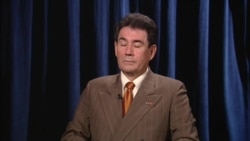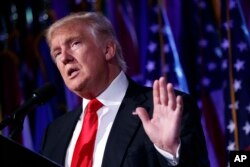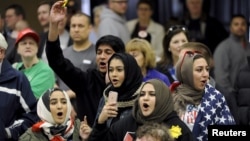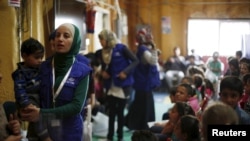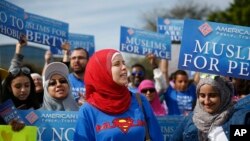During his presidential campaign, Donald Trump was outspoken on immigration, saying he would deport millions of undocumented immigrants in the United States, build a wall along the U.S.-Mexican border, and ban Muslims or those trying to enter the United States from countries that pose terror threats.
Just over a week after Trump's election, VOA's Latin America division interviewed Luis Quiñonez, a member of the Hispanic Advisory Council to the president-elect, about potential immigration policies.
This transcript from the Nov. 17 interview has been edited for clarity and length.
VOA: Has Trump maintained his campaign position that there would be a ban on people coming from Muslim countries unless the U.S. sorts out how to stop terrorists from entering?
Quiñonez: It is not a ban. We will slow down the process so we can verify who they are. We've had instances of individuals trained by ISIS (an acronym for the Islamic State group) trying to penetrate the U.S. using tourist visas. We want to make sure we verify who they are.
VOA: Kansas Secretary of State Kris Kobach, an adviser to Trump, has suggested there are plans for Muslim immigrants having to register with the government. Is this racial profiling? Will Trump do this?
Quiñonez: No. In reality, everyone who visits the United States is registering to verify who they are. We want to avoid people coming with tourist visas and overstaying.
VOA: How does that differ from current laws?
Quiñonez: It is the same law but [in the] last eight years it was not enforced. We are dusting off what has been in place to make it successful again.
VOA: What about people coming from Syria and Iraq as refugees, will that change?
Quiñonez: No, we want to make sure they are true refugees and they are not Trojan horses — people coming disguised as refugees. That can be tricky and may slow down the process to verify who they are.
VOA: Does it mean the government will play closer attention to people coming from those countries?
Quiñonez: All countries, including Syria, worry about potential ISIS infiltrators, some of them paying corrupt officials in El Salvador and entering the U.S. through the border or airports. We will ensure they are not a threat to the United States.
VOA: Regarding sanctuary cities, mayors say their cities will remain sanctuaries for immigrants. Trump has said in the past these are bad policies and are bad for the cities' security. Do you think the federal government will push for giving the police the right to check people's status?
Quiñonez: This country will abide by the rule of law. ... We can (with)hold money to help (sanctuary cities) from the federal government side. ... We will withhold that money if they want to continue with that nonsense. Secondly, under the criminal statute of the United States, Title 18, there is a specific crime where if a government official does not take action in the face of a criminal offense, they become guilty of a felony — it is called misprision of a felony. So, basically, if they want to push us against a corner, what will happen is some of the mayors and chiefs of police and governors could be charged criminally with failure to report a felony — misprision of a felony.
VOA: Some people argue ... some police officers can go up to anyone based on how they look and can request proof of their immigration status? Do you think what Donald Trump is suggesting will incentivize racial profiling?
Quiñonez: No, absolutely not. Profiling is actually more than just race. There is a lot of things that are telling when someone enters the United States. Recently, investigators can tell by the way you dress, the shoes you wear, your conduct, whether you are potentially a threat to the United States. We're not going to be asking every policeman and every law enforcement officer to stop people just because they look different. What we are saying is, officials in sanctuary cities need to notify the federal government, Immigration Customs Enforcement (ICE), if someone is arrested. ... We can check that against a database to find out if this person is a legal resident or a citizen. ... If they are already in jail. It just takes 15 minutes to verify if these people are criminals or not. That is not profiling, it is not asking anything special from the cities to do for us. ... If there is something that comes back, and this person has no record in immigration files, then notify the federal officials to go forward and investigate further. If we are going to be stopping people just because they are wearing a hat, no, that's nonsense.
VOA: Will Trump's immigration policies effect the asylum application system?
Quiñonez: The person seeking asylum has to show they are persecuted and pursued by a government because of their views, and (the current administration has) not done that effectively. Someone says, I am afraid to live in my country. OK, there are some dangerous places to live. Here in the U.S. that should not be the sole reason to let someone in. We must verify why this person should be awarded asylum.
VOA: Will Obama's political changes in Cuba remain the same or will Trump's government ask for more concessions from Cuba?
Quiñonez: We will ask for more. There will be a change in attitude. We expect liberty and people to be free the way they should be free.
VOA: For Muslims here legally, is there a reason for them to be concerned about Trump?
Quiñonez: No. ... We will target extreme Muslims. Anyone who wants to do harm, we will pursue, and anyone who wants to contribute, we won't profile. If you know someone who may be a threat to the United States, help us out. We have had many Muslims report on people with extreme views, and we have stopped potential attacks on our citizens.
VOA: Some Trump supporters are going after Muslims based on what they are wearing. How do you send a message that this is not right?
Quiñonez: We don't tolerate ill treatment toward anyone no matter where they come from. They should be respected. If we know someone targeting immigrants, we will have them arrested. They can call the Justice Department, describe the problem and we will take care of it. People attacking immigrants is wrong. We have discovered operatives who hire homeless people and ask them to commit violence against people. ...
VOA: There are rumors of mass deportations, kids are scared, mothers are scared.
Quiñonez: They are lies. The president-elect asked us to be in a conference call he said, “Tell them there won't be mass deportations.” The criminals will be deported. We will also deport those who abuse their tourist visa. If you stay here and pay taxes and Social Security and you are building a retirement, we will smooth the process to allow them to be part of the labor force. If you commit a crime, you will be in a database and we will find you.
VOA: How will that happen?
Quiñonez: On the 21st [of each month], we will check databases and find criminals where they are located. We are hiring 7,500 new border patrol agents.




